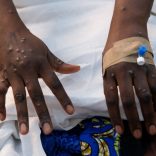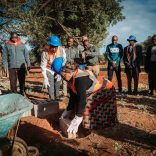Mozambique Number of confirmed mpox cases rises to 13
Mozambique: May saw sharp rise in violence in Cabo Delgado – UN

FILE - For illustration purposes only. [File photo: Lusa]
The United Nations as warned that “May saw the sharpest rise in violence in Cabo Delgado since June 2022,” affecting more than 134,000 people in 61 security incidents.
According to a report by the United Nations Office for the Coordination of Humanitarian Affairs (OCHA), of the 61 security incidents resulting from the escalation of violence in that northern province of Mozambique, 38 involved attacks on civilians.
“Confirmed casualties included ten killings, some beheadings, and at least 45 abductions, many children.,” the document states.
The gas-rich province of Cabo Delgado, in the north of the country, has been facing an armed rebellion since 2017, which has left thousands dead and caused a humanitarian crisis with more than a million people displaced.
The new movements of extremists in northern Mozambique include Niassa, a province neighbouring Cabo Delgado, where, since their outbreak on April 29, they have caused at least two deaths: two game reserve forest rangers were beheaded.
According to the UN agency, “the sharpest increase in violence” in May was mainly concentrated in the districts of Mocímboa da Praia, Muidumbe, Macomia, Ancuabe, Montepuez and Palma, spreading to Mecula in Niassa province, where around 2,000 people fled their villages.
“The increased use of improvised explosive devices (IEDs) further endangered civilians, with three incidents reported in May—one injuring a man in Quiterajo (19 May) and another injuring several civilians, including children, in Nangade (23 May).3),” it said.
According to OCHA, insecurity has “disrupted essential services: mobile health teams suspended operations, and schools closed in Ancuabe, Montepuez, and Nangade”.
While attacks by armed groups increase in Cabo Delgado, the UN agency also warns that tensions between internally displaced persons and host communities have worsened.
“In Muidumbe, site leaders, following local authorities’ orders, denied registration to 1,242 newly arrived IDPs—including 472 children—while Força Local militia were instructed to repel displaced populations by force.,” the report explains, stressing that” community frustration” has compounded operational challenges.
Increased social tensions, stemming from public dissatisfaction with aid distribution, led to the looting of food supplies and humanitarian trucks in Chiúre and Mocímboa da Praia, according to the document.
“By 29 May, an international NGO suspended food distributions in Macomia, relocating two international staff members to Pemba due to increased threats,” the text adds.
In 2024 alone, at least 349 people died in attacks by Islamic extremist groups in northern Mozambique, an increase of 36% over the previous year, according to a study released by the Africa Centre for Strategic Studies (ACSS), an academic institution of the US Department of Defence.












Leave a Reply
Be the First to Comment!
You must be logged in to post a comment.
You must be logged in to post a comment.